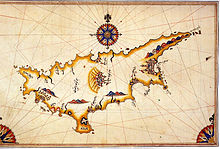Osman Fazli | |
|---|---|
 Osman Fazli's tomb is at Famagusta, Cyprus | |
| Personal | |
| Born | 7 July 1632 |
| Died | 1691 (aged 58–59) |
| Resting place | Famagusta, Cyprus |
| Religion | Islam |
| Jurisprudence | Sunni |
| Movement | Sufism |
| Main interest(s) | Mysticism, Theology |
| Notable work(s) | Commentaries on Ibn Arabi and Sadreddîn Konevî |
| Tariqa | Jelveti |
| Other names | Atpazarî Osman Fazlı-Allah, Kutup Osman Fazlı |
| Occupation | Sheikh, Author, |
| Muslim leader | |
Influenced by
| |
Influenced | |
| Part of a series on Islam Sufism |
|---|
 |
|
|
Osman Fazli (Turkish: Atpazarı Osman Fazlı-ilahi or Kutb Osman Fazlı), was a Jelveti Sufi spiritual guide in 17th-century Ottoman Empire. He spent c.25 years teaching and preaching, and became head Sheikh of the order in Istanbul and led the studies, conversation, meditation, and dhikr. But when he was about 48 it was revealed to him that the Ottoman Empire would fall into ruin, and, although he was of reclusive temperament, felt the only way to care for its population was to be at the Sultan's court. There he was outspoken against many of the Grand Vizier's plans: that they would bring disaster and misfortune, and he was proven right. He spent some years at court but when he declared one Grand Vizier's plan as against the sharia and distorting the Quran, the only way the Vizier could silence him was with exile. Osman Fazli went into retreat but emerged with a different course of action: he was leading a band of Sufis towards the battlefront when he was arrested and exiled for good. Osman Fazli exemplifies the Jelveti way: that following union with Allah he returns and acts in the world. He is hushyar (awake).